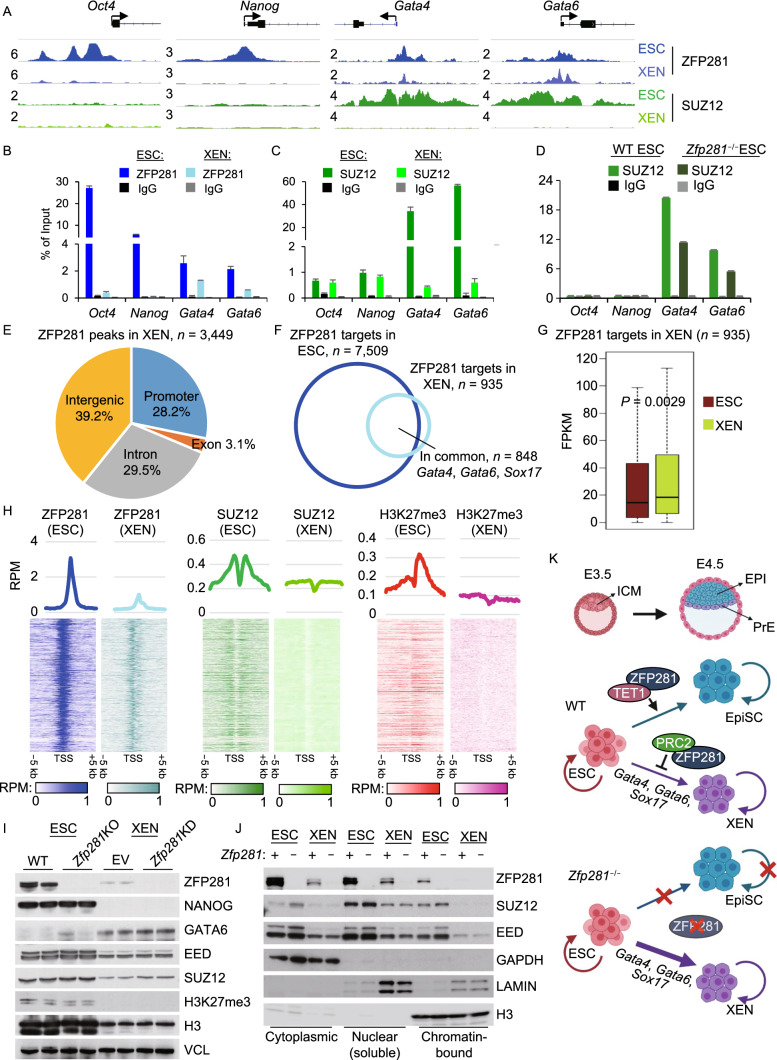Correction to: Protein Cell https://doi.org/10.1007/s13238-020-00775-x
In the original publication the labelling in middle and bottom panels of Fig. 2K is published incorrectly as “Soc17”. The correct labeling is available in this correction as “Sox17”.
ZFP281 recruits PRC2 for transcriptional repression of PrE master regulators in ESC-to-XEN differentiation. (A) ChIP-seq tracks of ZFP281 and SUZ12 chromatin-binding at Oct4, Nanog, Gata4, and Gata6 promoters in ESCs and XENs. Track heights of different ChIP-seq data were normalized to the same mapped reads per million total reads (RPM). (B and C) ChIP-qPCR for the ZFP281 (B) and SUZ12 (C) chromatin-binding at Oct4, Nanog, Gata4, and Gata6 promoters. (D) ChIP-qPCR for the SUZ12 chromatin-binding in WT and Zfp281−/− ESCs at Oct4, Nanog, Gata4, and Gata6 promoters. (E) Distribution of ZFP281 ChIP-seq peaks in XENs. Promoter was defined as a peak distance to TSS less than 1k bp. (F) Overlap of the ZFP281 targets (peak distance to TSS < 1 k bp) in ESCs and XENs. (G) Relative expression of the ZFP281 targets in XENs (n = 935) to that in ESCs. P-value is from a Mann-Whitney test. (H) Mean intensity plots (RPM) and heatmaps of ZFP281, SUZ12, and H3K27me3 ChIP-seq data in ESCs and XENs enriched at TSSs of the ZFP281 target genes in XENs (n = 935). H3K27me3 ChIP-seq in ESCs were curated from (Cruz-Molina et al., 2017). (I) Expression of ZFP281, SUZ12, EED, and H3K27me3 in ESCs and XENs. Two KO clones (2.6 Null, 3.34 Null) of Zfp281−/− ESCs and KD by two shRNAs (sh#1, sh#3) were used to deplete Zfp281 in ESCs and XENs, respectively. VCL (Vinculin) served as the protein loading control. (J) Expression of ZFP281, SUZ12, and EED in different subcellular fractions in ESCs and XENs. Zfp281 was depleted by KO in ESCs and by KD in XENs. GAPDH, LAMIN, and H3 (Histone3) served as the control proteins in cytoplasmic, nuclear (soluble) and chromatin-bound fractions, respectively. (K) Depiction of the working model. During the in vivo ICM to EPI/PrE differentiation and in vitro ESC to EpiSC/XEN differentiation, ZFP281 functions as a barrier in ESC-to-XEN (ICM-to-PrE) differentiation by recruiting PRC2 for transcriptional repression of PrE genes Gata4, Gata6, and Sox17. ZFP281 is dispensable for self-renewal of ESCs and XENs, but is indispensable for ESC-to-EpiSC differentiation through a ZFP281-TET1 partnership and for self-renewal of EpiSCs (Fidalgo et al., 2016)



